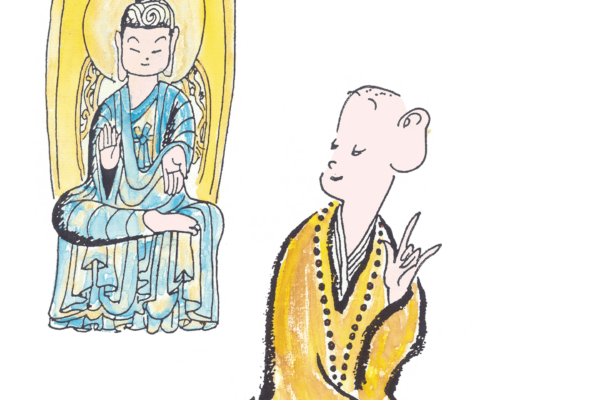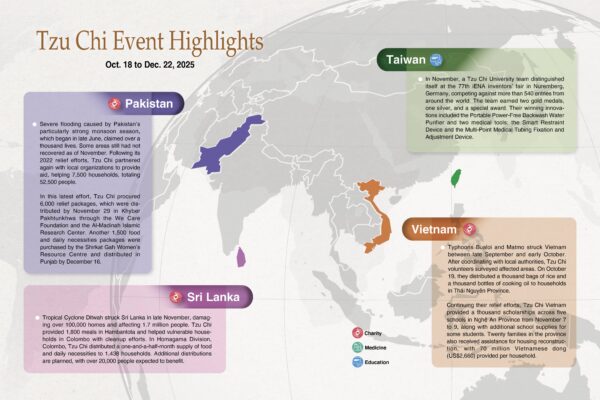By Nadya Chou
Translated by Wu Hsiao-ting
Photos by Alberto Buzzola
It was a challenge to launch distributions in Warsaw, Poland, where there is no Tzu Chi office and where we had to start everything from scratch. However, all our hard work was worth it when we embraced the displaced Ukrainians.
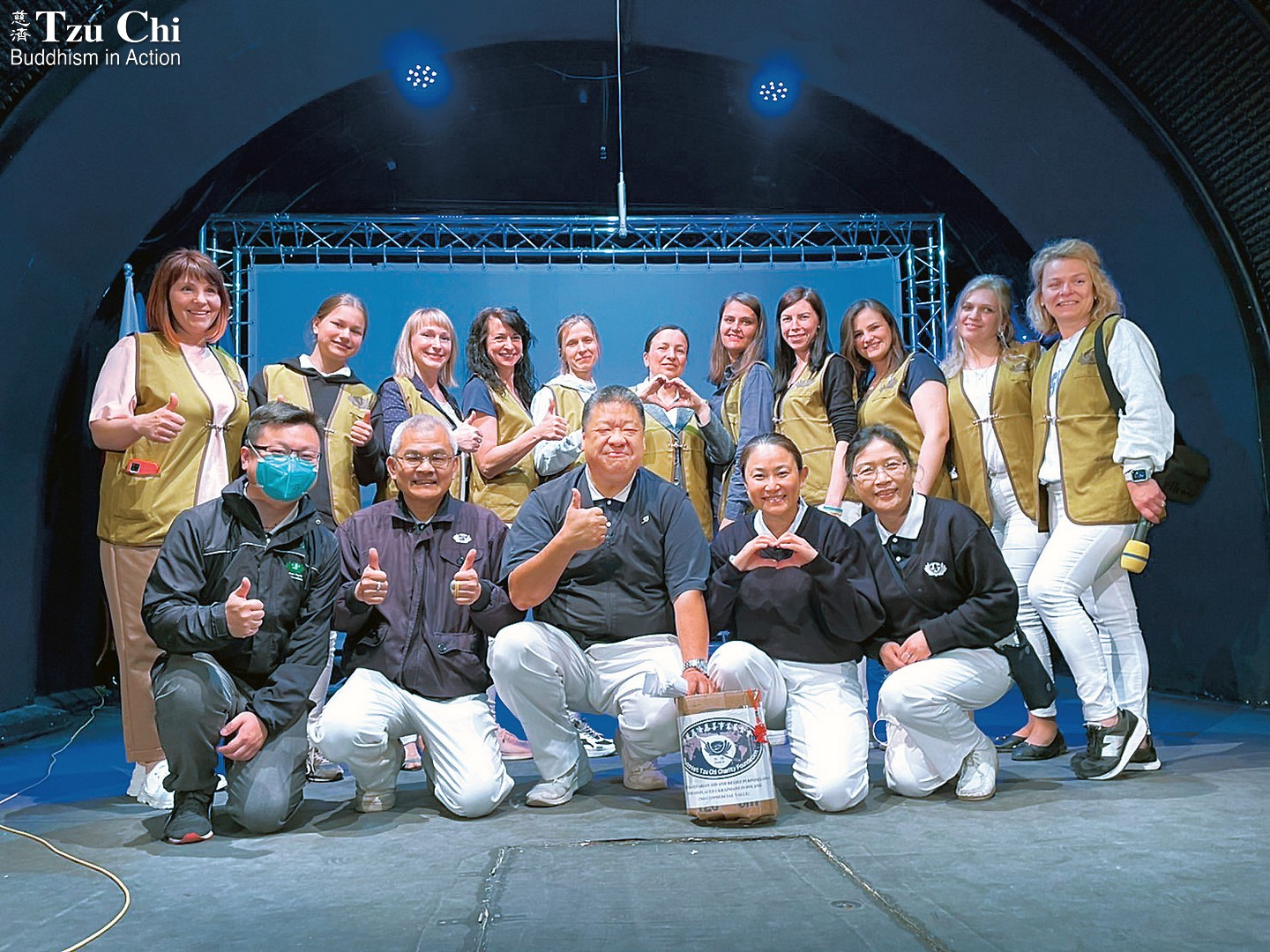
Tzu Chi volunteers from Turkey, Britain, and the United States pose with Ukrainian participants of a Tzu Chi work relief program. Courtesy of Polish Tzu Chi volunteers
My husband, Faisal Hu (胡光中), and I are both Tzu Chi volunteers in Turkey. In late April, we went to Poland to help carry out Tzu Chi distributions for displaced Ukrainians. We set off from Istanbul, drove more than 2,000 kilometers (1,240 miles) through several countries, and crossed the border into Poland three days later. As strangers to the country, we didn’t know what to expect and were thus a little uneasy when we entered a grocery store next to a gas station. However, our uneasiness was soon allayed by the store owner’s affability. He could tell we were not from Poland, and tried to strike up a conversation with us. Though we didn’t understand Polish, we could feel his friendliness.
After leaving the store, we continued to Warsaw, Poland’s capital. When we arrived, what we saw there instantly changed my impression of Warsaw, an outdated impression dating back to World War II. We saw a big, modern city: streets lined with office buildings housing large corporations, its general architectural style simple and clean. It gave me a feeling very similar to that of Finland, Denmark, and other northern European countries. I could feel a huge, vibrant energy emanating from the city. No wonder the country could take in so many refugees from Ukraine. I instantly took a liking to Poland.
To get a better understanding of the current refugee situation, we accompanied Debra Boudreaux (曾慈慧), CEO of Tzu Chi USA, to visit Poland’s border with Ukraine. We found that very few people were crossing the border from Ukraine to Poland, whereas a long stream of vehicles was doing the opposite: going from Poland into Ukraine. The situation was apparently very different than it was just a month before.
Back in Warsaw, we visited the local Red Cross, the Camillian Mission of Social Welfare, and other humanitarian organizations to discuss our cooperation with them or explore possible partnerships. We held our first volunteer training session on May 1. Among the participants were 16 Ukrainian refugees taking part in a Tzu Chi work relief program. We had the manpower and the gift cards ready, but we had yet to obtain aid recipient lists.
My husband and I considered replicating the operational model we used in Turkey, where we’d make home visits to Syrian refugee families to compile our care recipient rosters. But we found that that wouldn’t work in Poland. Many Ukrainians were staying in the homes of local Polish families, which made it inconvenient to visit them.
My husband and a volunteer team in Turkey met online for several days in a row to work out a solution to this challenge. They eventually developed an online questionnaire for refugees to fill out to receive our aid. After refugees had completed the form and their identity was confirmed, a text message would be sent to notify them to come to us to receive their aid. This strategy respected the local government’s wish to protect privacy while still allowing us to get our aid into the hands of needy people.
Getting this system set up and running smoothly in Warsaw was possible due to efforts of Basil Khalil, Hani Aldib, and Hady Souki. Khalil and Aldib, both IT engineers, are Syrian volunteers in Turkey. Souki is also a Syrian refugee but lives in the Netherlands now. Their work saved us a lot of effort in compiling recipient information and also allowed us to estimate the number of people who would come for our aid, making it easier for us to prepare enough blankets and gift cards for distribution. They deserve many thanks for their outstanding work for Tzu Chi and the Ukrainians in need in Poland.
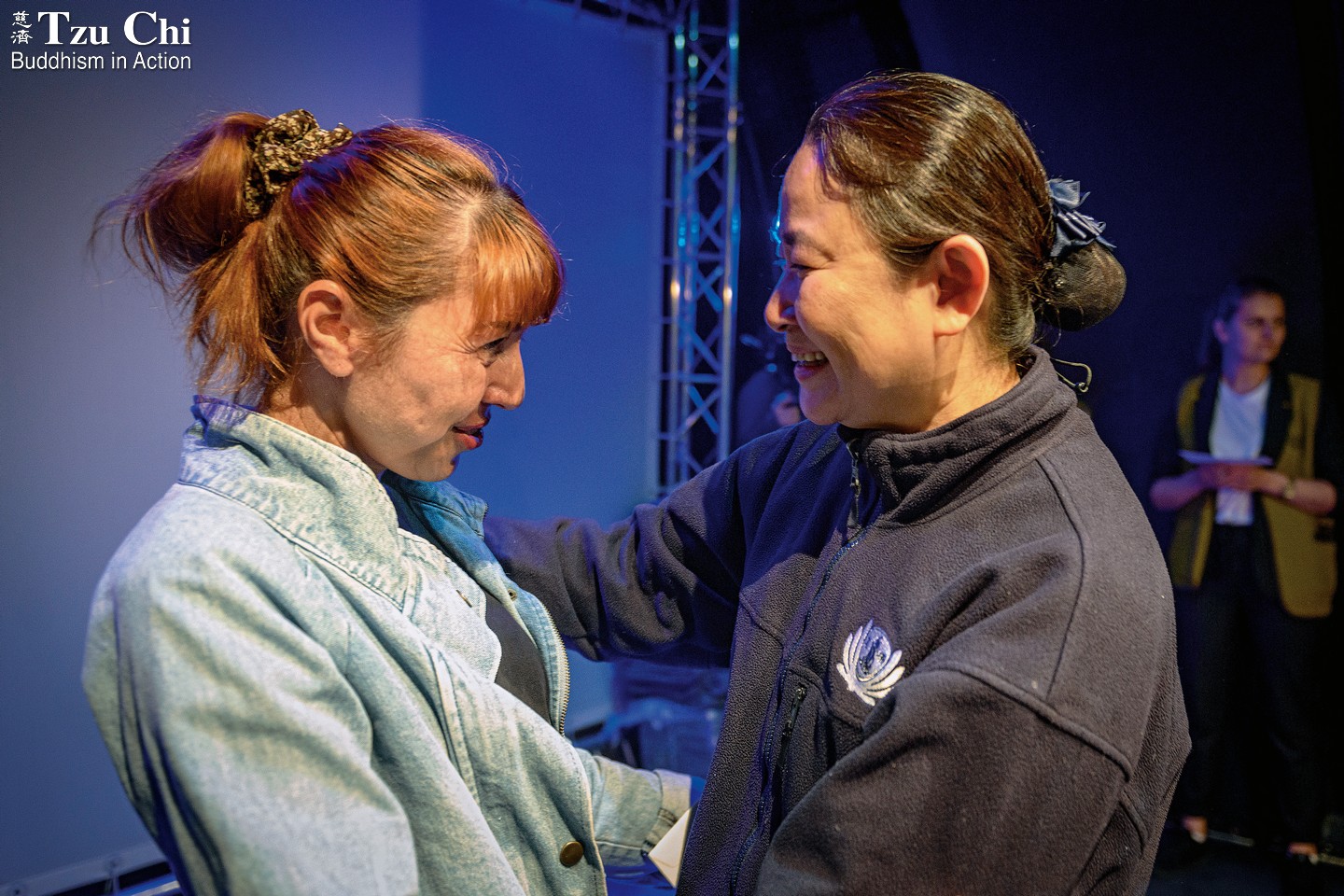
Tzu Chi volunteer Nadya Chou (周如意), the author of this article, interacts with a Ukrainian at a Tzu Chi distribution in Warsaw, Poland.
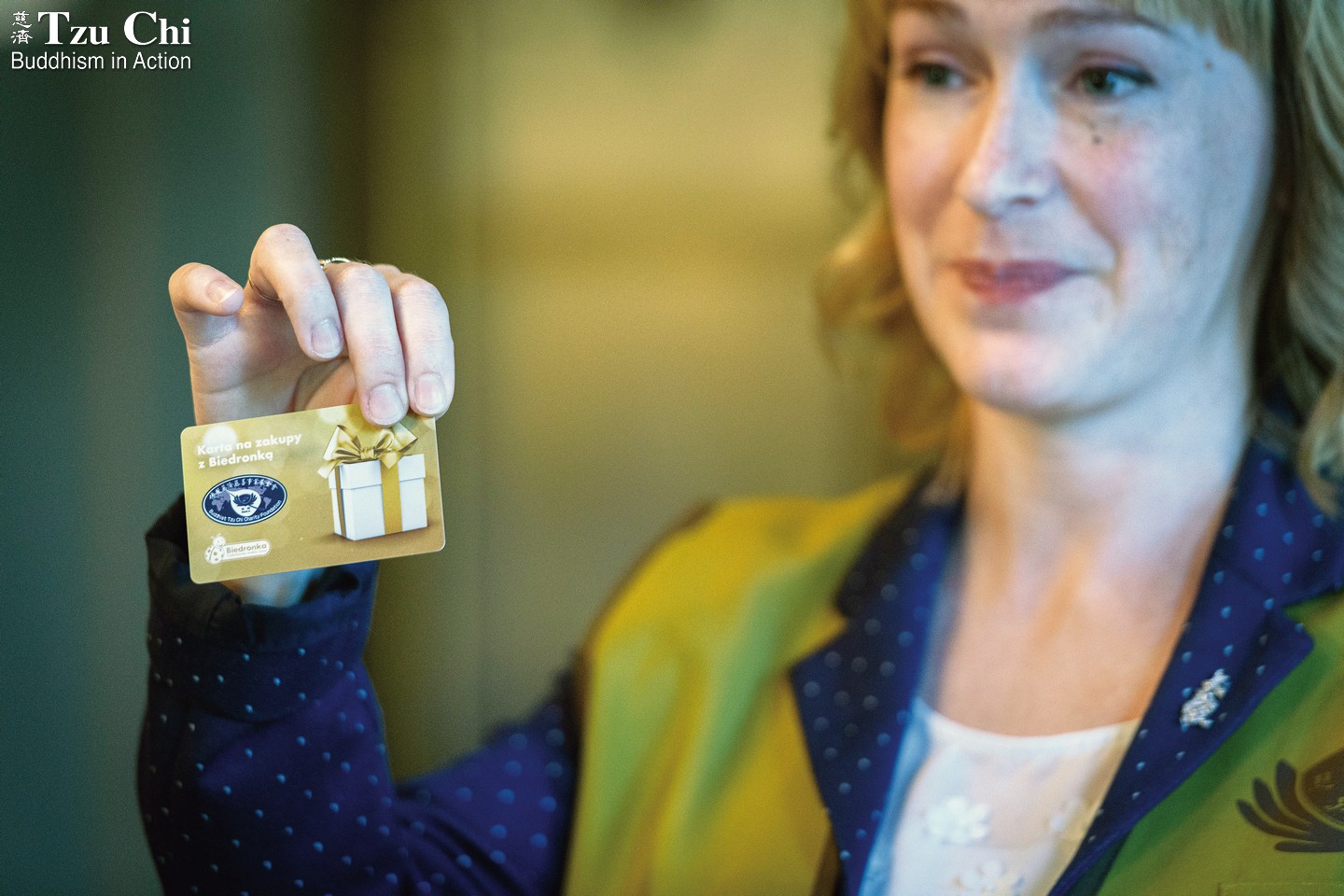
The gift cards distributed by Tzu Chi to displaced Ukrainians in Poland, loaded with 2,000 Polish zlotys each, are redeemable at Biedronka supermarkets, a widely available retail chain in the country.
Conveying love with hugs
We decided to hold our distributions in Warsaw at a Salesian church’s oratorium. Father Sławomir Szczodrowski said that his church had been providing hot food and daily necessities to displaced Ukrainians since the war started, but with that aid effort had come increasing financial pressure. “The help from Tzu Chi is just what we need at this time,” said the priest. “We can work together to help these suffering people through this difficult time.”
More than 250 families (over 600 Ukrainians) registered for and came to our first distribution in early May. According to years of experience helping Syrian refugees in Turkey, this was just the beginning. Tzu Chi volunteers from more than ten countries had gathered in Poland to help conduct distributions or carry out other aid work not just in Warsaw, but also in Lublin, Poznań, and Szczecin.
In Warsaw, we began receiving more and more filled-out questionnaire forms. We needed to print out these forms before every distribution so that we could compare them with the identity documents produced by the people coming to our distributions. We also needed to send out text messages informing prospective recipients of the place and time of the event. We made careful arrangements at every distribution to make it easy for recipients to circulate through the venue. We are indebted to the Ukrainians participating in our work relief program for successfully pulling off every distribution.
Many recipients cried as they listened while a consolation letter from Dharma Master Cheng Yen was read at the distributions. The gift cards distributed were worth 2,000 Polish zlotys (US$450) each. Our Ukrainian helpers explained to everyone on-site that they were made possible by the donations of people in Taiwan and other places around the world, such as those collected on-site via coin banks or other containers. We encouraged the recipients not to forget to give back to the Polish families who had helped them.
At every distribution, we politely handed over envelopes containing gift cards to recipients. Then everyone hugged. Tears of gratitude and other emotions flowed. The recipients thanked us for coming from afar to deliver love and care to them.
I am back in Turkey now, but I still hear from our Ukrainian helpers. They told me they missed me and asked when I was visiting Poland again. When I was with them in Poland, I often felt we were like family. I often embraced them to convey my love for them. They embraced me a lot too, making me feel very warm at heart.
I’m originally from Taiwan. Most Taiwanese people are shy and not used to such embraces, but this way of expressing affection grew on me after I started serving Syrian refugees in Turkey. The Syrian women receiving care from us often hug me, followed by pecks on my two cheeks—this is a habit of theirs. I can feel their warmth through such physical contact, and their gratitude for us is often written on their faces and in their eyes. I’m deeply thankful to have learned from the Syrians this way of interacting with others. When I was in Poland, I used it to pass on my love to the Ukrainians I encountered.
The Ukrainians and Syrians have both been victims of war, and they all need help, whether physically or mentally. Tzu Chi’s love will always be there for them, be it in the form of a consolation letter, a gift card, or a warm hug. We will always be there.
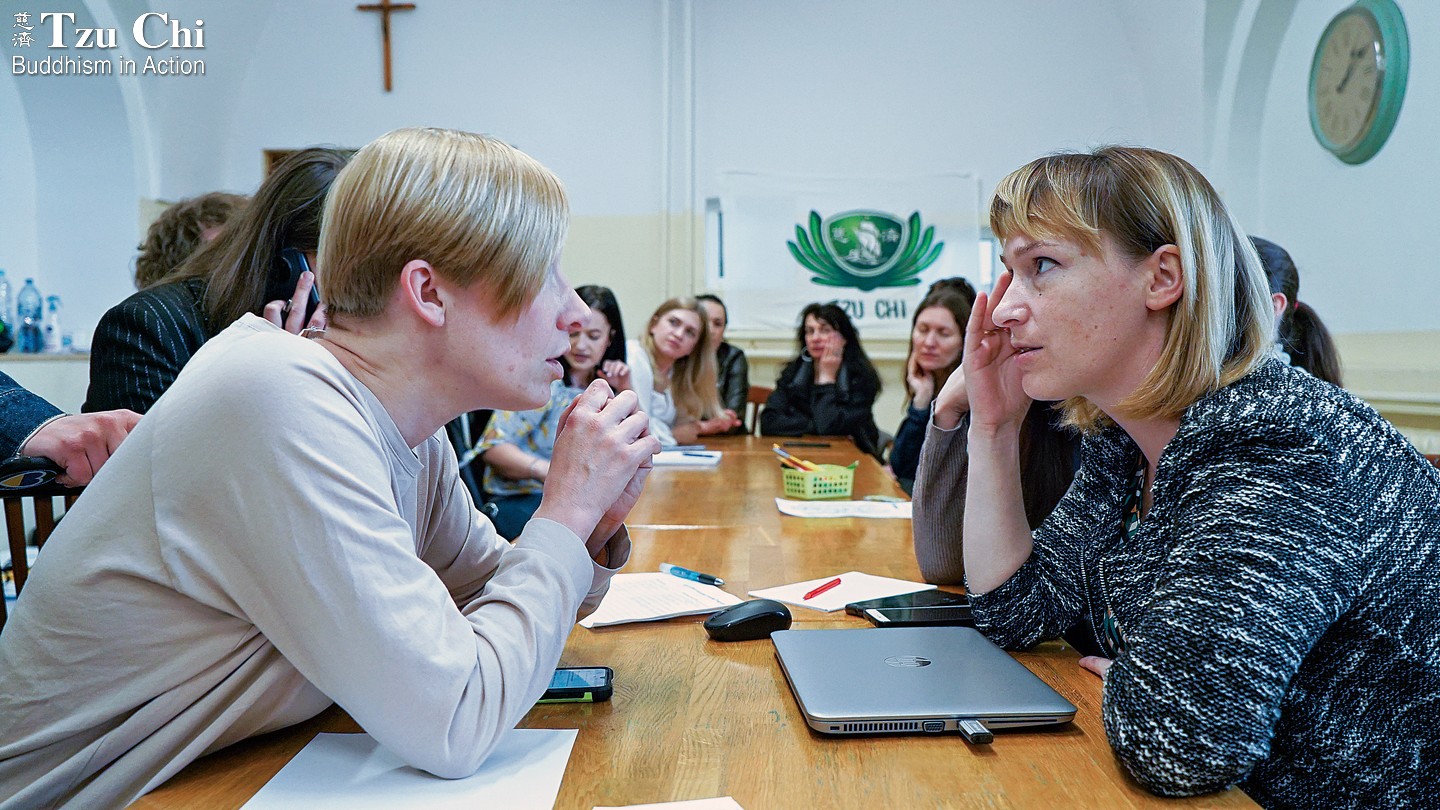
Aside from providing Ukrainian refugees with necessities and gift cards, Tzu Chi launched work relief programs for displaced Ukrainians in Warsaw, Lublin, and Poznań to enlist their help with Tzu Chi distributions. Pictured here is a volunteer training session held for such helpers in Warsaw. Zhong Wan-yin
❝
My husband and I have eight children. When I learned about the gift cards my family would receive, I cried with joy. It is enough to supply us with food for half a year or so.
─Natalila
❞
❝
Four other mothers and I arrived in Poland from Ukraine with 12 children in a nine-passenger vehicle. All five of our families received aid from Tzu Chi. We were so touched we decided each of our families would donate a gift card back to Tzu Chi to help our fellow compatriots.
—Julia
❞
❝
What you gave us was not only money, but also a lot of love. I’ll pray for you too, for heaven to protect you. Love is something we can share. It’s now my life’s mission to share love.
—Sasha
❞

